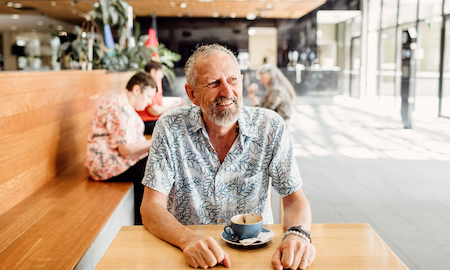European amyloidosis meeting highlighted the need to improve education
Vince O’Donnell learnt of the concerningly low rates of referral for people at risk of amyloidosis when he attended the second European meeting for ATTR amyloidosis for doctors and patients.
The meeting, in Berlin (Germany) last September (2019), is held every two years by the Amyloidosis Alliance: The Voice of Patients, a global entity dedicated to improving the quality of care and experience of amyloidosis patients by exchanging experiences and constructive interactions at an international level.

Vince and his partner, Terri, link closely with the Australian Amyloidosis Network (AAN) and have been active in the Australian amyloidosis community since Vince was diagnosed with hereditary amyloidosis polyneuropathy with cardiomyopathy in 2014.
In his advocacy role, Vince said he represents Australian patients’ concerns and encourages the inclusion of the patient-perspective in improving diagnosis, treatment and care for all types of amyloidosis.
“The three days of the meeting were full of lectures, talks, networking and information sharing,” said Vince, 64, of Queensland.
The Alliance taskforce presented its findings from the 2018 initiatives, including the improvement of education, accessibility of medications and an upcoming trials report.
Vince said a pilot study presented at the meeting found most GPs didn’t give their patients a referral despite an alert showing the possibility of an amyloidosis diagnosis appearing on their computer screens.
“Ideally, every medical school across all primary healthcare should be educated going forward,” said Vince.
“The AAN does this in some capacity but patients need to be more involved and at the very least made aware this is happening.
“Advancements across the whole sector also need to be promoted to ensure the continued education of general practitioners, specialists, primary health carers and the wider community,” said Vince.
In 2019, new Alliance taskforces started working on Standards for Cure and Care, Research and Trials, Advocacy, and AL Amyloidosis.
“Of particular interest was the Nutritional Aspects report by Dr Anna Hüsing-Kabar (Münster),” said Vince.
“Terri and I have asked to join the Lifestyle taskforce should the initiative be voted in this year.”
At a dinner at the Bode Museum, Vince spoke with fellow members of The Asia-Pacific Regional Network; a subgroup under the Amyloidosis Alliance for patients from Australia, South Korea, Japan and New Zealand.
“We hope China, Thailand, Vietnam and India, along with other Asia Pacific countries will join our regional network,” said Vince.
“Terri and I will continue to advocate for Australia’s formal membership of the Amyloidosis Alliance as we are only classed as an Associated Patients Group.
“We will also continue to meet with our regional network and seek others who want to work with us flying the flag for all Australians living with amyloidosis and their families,” he said.
Read Vince’s story of living with hereditary amyloid polyneuropathy with cardiomyopathy, from the January 2019 issue of Amyloidosis News.
Last updated on January 5th, 2023
Developed by the Leukaemia Foundation in consultation with people living with a blood cancer, Leukaemia Foundation support staff, haematology nursing staff and/or Australian clinical haematologists. This content is provided for information purposes only and we urge you to always seek advice from a registered health care professional for diagnosis, treatment and answers to your medical questions, including the suitability of a particular therapy, service, product or treatment in your circumstances. The Leukaemia Foundation shall not bear any liability for any person relying on the materials contained on this website.